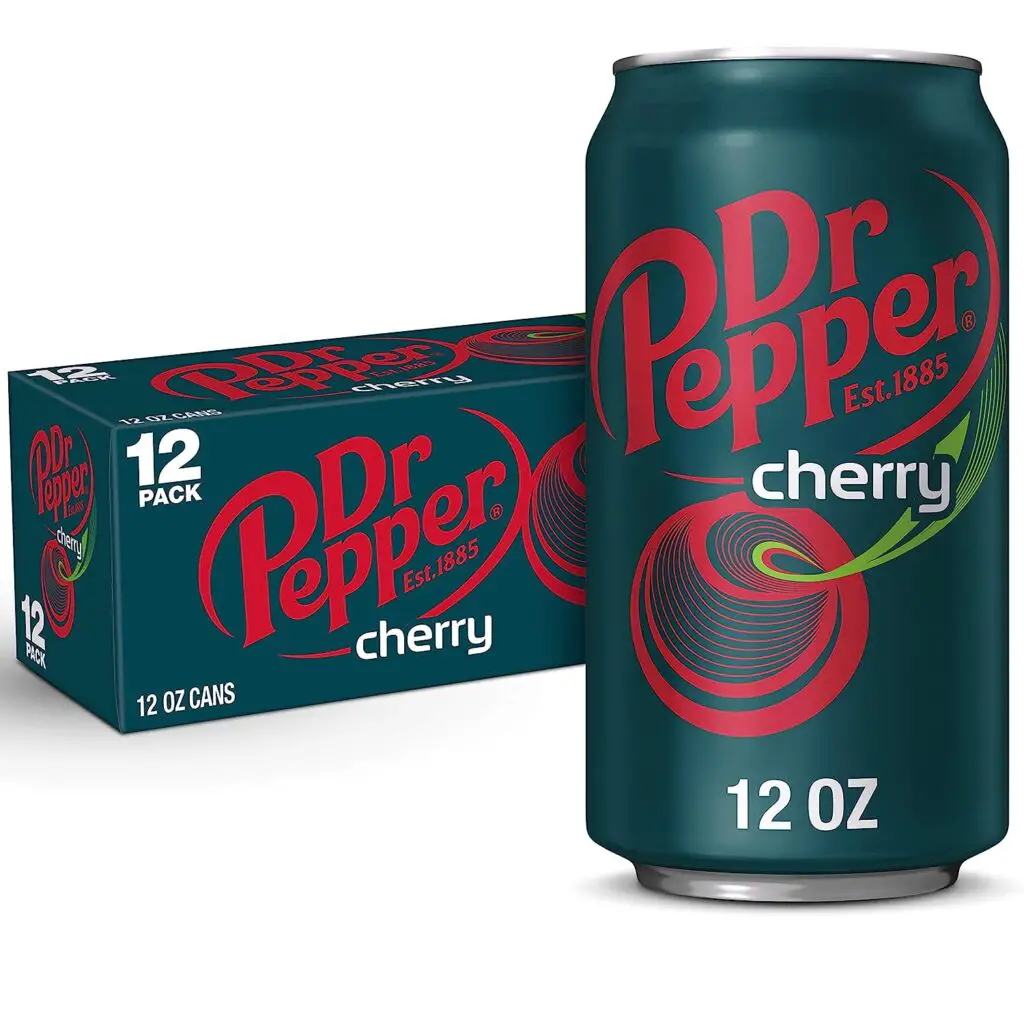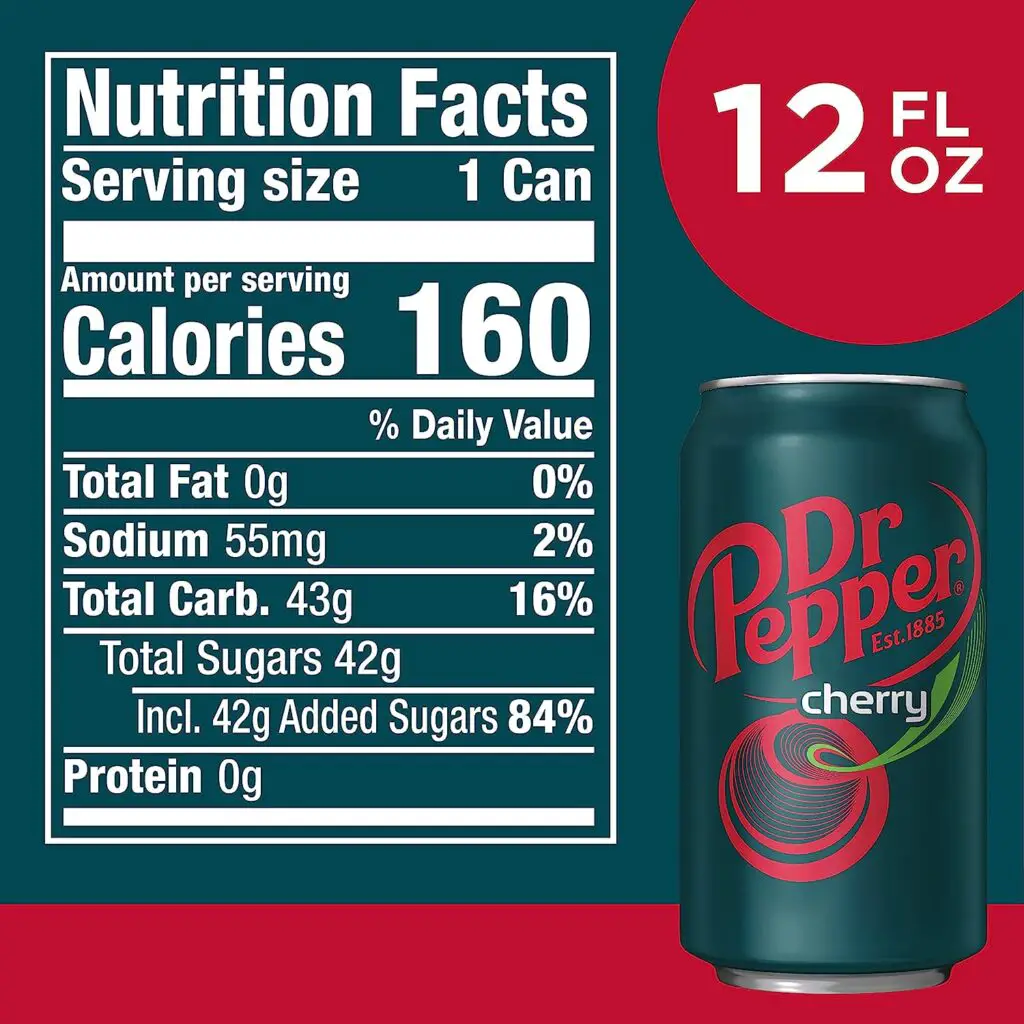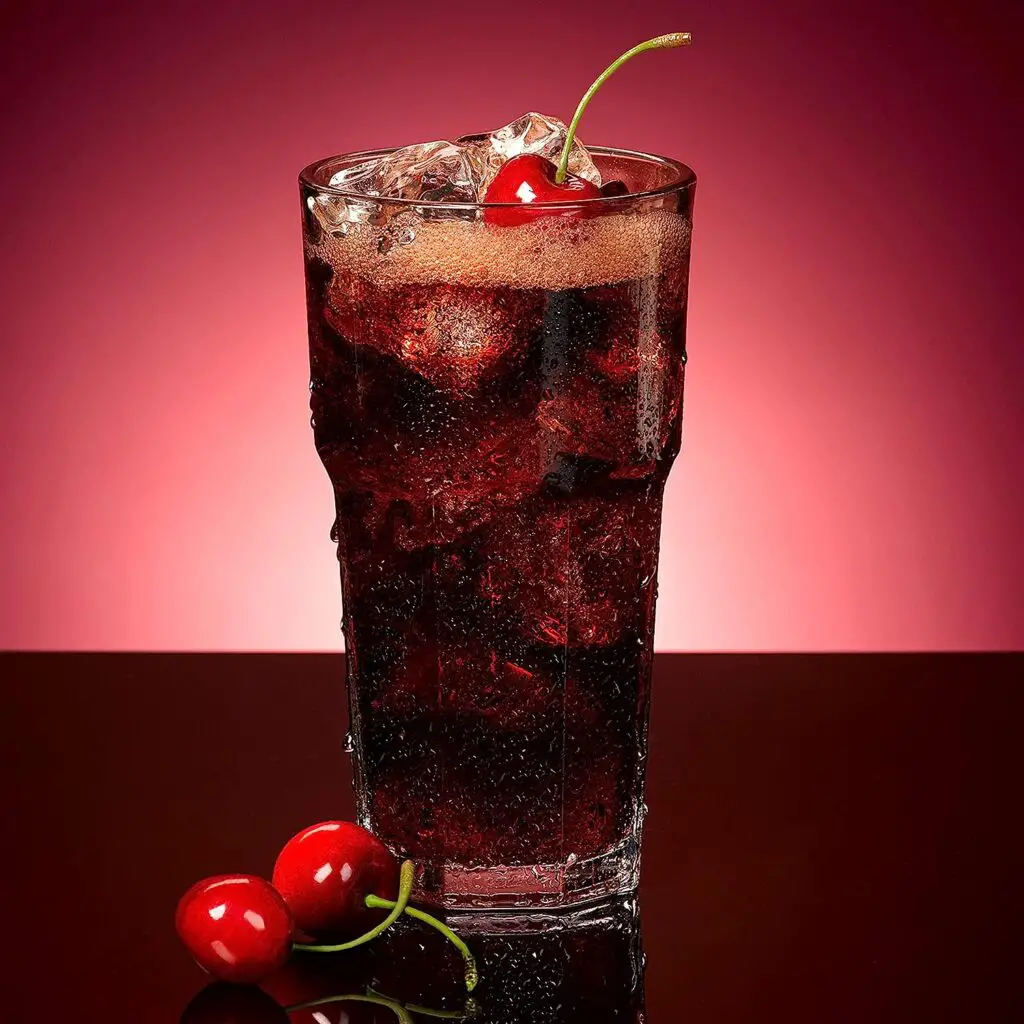If you’re a fan of Dr. Pepper, you may be wondering just how much caffeine is in your favorite soda. Caffeine is a popular stimulant found in many beverages, including carbonated soft drinks. In this blog post, we’ll delve into the facts about how much caffeine is in Dr. Pepper and explore how it compares to other popular sodas. So, if you’re curious about the caffeine kick you’re getting from your Dr. Pepper, keep reading to find out all the details.
The Popularity Of Dr. Pepper

Over the years, Dr. Pepper has become a staple beverage for many individuals. Its distinct flavor and carbonated texture make it a refreshing choice for those looking for something different from traditional colas. People of all ages enjoy Dr. Pepper, and it is often seen as a symbol of nostalgia.
Importance Of Knowing Caffeine Content In Beverages
Caffeine is a stimulant that can temporarily boost energy and increase alertness. It is found in various beverages, including coffee, tea, energy drinks, and soft drinks like Dr. Pepper. It is important to be aware of the caffeine content in these beverages, as excessive consumption can lead to negative effects such as difficulty sleeping, increased heart rate, and irritability.
Knowing the caffeine content in Dr. Pepper allows individuals to make informed decisions about their consumption. It is especially important for those sensitive to caffeine or needing to monitor their caffeine intake for medical or personal reasons. By understanding the caffeine content, individuals can enjoy Dr. Pepper in moderation and balance their overall caffeine consumption from other sources.
How Much Caffeine is In Dr. Pepper?

Dr. Pepper contains caffeine, although the exact amount may vary depending on the serving size and product type. Here are some key points regarding the caffeine content in Dr. Pepper:
- On average, a 12-ounce (355 mL) can of Dr. Pepper contains about 41 milligrams (mg) of caffeine.
- This amount of caffeine is moderate and is roughly equal to the amount found in a cup of coffee.
- It is important to note that individual tolerance to caffeine may vary, and the effects of caffeine can depend on factors such as body weight and sensitivity.
To put the caffeine content in perspective and compare it to other beverages:
- A 12-ounce (355 mL) serving of Dr. Pepper contains slightly more caffeine than a typical serving of Coca-Cola, which contains about 34 mg of caffeine.
- According to the Mayo Clinic, the daily recommended limit for caffeine intake is 400 mg for adults. Monitoring overall caffeine intake from various sources is essential to prevent excessive consumption.
It’s worth noting that Dr. Pepper also offers a diet version of its drink called Diet Dr. Pepper. This diet version is sweetened with artificial sweeteners and has fewer calories. It contains about ten calories and 3 grams of carbohydrates per 12-ounce serving, making it a lower-calorie alternative for reducing sugar intake.
Comparing The Caffeine Content In Different Beverages
Here is a comparison of the caffeine content in various beverages:
| Beverage | Caffeine Content (per 12 fl oz) |
|---|---|
| Dr. Pepper | 41 mg |
| Coca-Cola | 34 mg |
| Coffee | 95 mg – 165 mg |
| Black Tea | 25 mg – 48 mg |
| Green Tea | 25 mg – 29 mg |
| Energy Drinks | 70 mg – 160 mg |
It’s important to keep in mind that individual caffeine tolerances can vary. Some individuals may be more sensitive to caffeine and need to limit their intake, while others may be able to consume higher amounts without experiencing negative effects.
By being aware of the caffeine content in beverages like Dr. Pepper, individuals can make informed choices and enjoy their favorite drinks responsibly.
Understanding Dr. Pepper
Dr. Pepper is a popular carbonated soft drink that many have enjoyed for over a century. Let’s delve into this iconic beverage’s history, flavors, and ingredients.
History And Origins Of Dr. Pepper
Dr. Pepper was created by pharmacist Charles Alderton in Waco, Texas, in the late 19th century. It was first served in 1885 and quickly gained popularity for its unique flavor. The exact recipe for Dr. Pepper is a closely guarded secret, but it is believed to contain a blend of 23 flavors, including cherry, vanilla, and caramel. Over the years, Dr. Pepper has become a beloved beverage in the United States and worldwide.
For more information about the history of Dr. Pepper, you can visit the official Dr. Pepper Museum website.
Flavors And Variations Of Dr. Pepper
Dr. Pepper offers a variety of flavors and variations to suit different preferences. Some popular options include:
- Diet Dr. Pepper: A low-calorie version of the original Dr. Pepper.
- Dr. Pepper Cherry: This variation adds a hint of cherry flavor to the classic Dr. Pepper taste.
- Diet Dr. Pepper Cherry: A diet-friendly option with a cherry twist.
- Cream Soda: Dr. Pepper Cream Soda offers a smooth and creamy taste.
- Cream Soda Zero Sugar: A zero-sugar version of the Cream Soda flavor.
- Dr. Pepper Made With Real Sugar: This version uses real sugar instead of high fructose corn syrup for a slightly different taste.
Ingredients In Dr. Pepper
The exact ingredients of Dr. Pepper may vary slightly depending on the specific product, but here are some commonly used ingredients:
- Carbonated water: Provides the fizzy texture of the beverage.
- High fructose corn syrup: A sweetener commonly used in soft drinks.
- Caramel color: Gives Dr. Pepper its signature dark hue.
- Phosphoric acid: This helps balance the flavor and adds a tangy taste.
- Natural and artificial flavors: These flavors contribute to the unique taste of Dr. Pepper.
- Sodium benzoate: An ingredient used as a preservative to extend the shelf life of the beverage.
- Caffeine: The stimulant that provides a mild energizing effect.
For a detailed list of ingredients and nutritional information, you can refer to the product packaging or visit the official Dr. Pepper website.
Understanding Dr. Pepper’s history, flavors, and ingredients can enhance your appreciation for this beloved beverage. Whether you enjoy the original flavor or prefer one of its variations, Dr. Pepper continues to be a popular choice for soda enthusiasts worldwide.
Health Effects Of Caffeine Consumption
Caffeine is generally considered safe when consumed in moderation. It can provide temporary energy and alertness, making it a popular choice for people who need a boost. However, excessive caffeine consumption can have negative health effects, including:
- Increased heart rate: Caffeine can cause your heart rate to rise temporarily.
- Trouble sleeping: Consuming caffeine close to bedtime can interfere with sleep.
- Jitteriness and anxiety: Some individuals may experience nervousness or anxiety after consuming large amounts of caffeine.
- Digestive issues: Caffeine can stimulate the digestive system and lead to increased bowel movements or stomach discomfort.
It’s important to listen to your body and consume caffeine in moderation. If you experience any negative effects or have concerns about caffeine consumption, it’s advisable to consult with a healthcare professional.
Overall, Dr. Pepper contains a moderate amount of caffeine compared to other beverages. Whether you choose regular Dr. Pepper or Diet Dr. Pepper, it’s always a good idea to be mindful of your caffeine intake and enjoy it in moderation.
Read more:
- Does Twisted Tea Contain Caffeine? All You Need to Know
- Does White Tea Have Caffeine? The Truth About White Tea and Caffeine
- Do Frappuccinos Have Caffeine?
- Fact Check: Does Powerade Have Caffeine?
- How Much Caffeine in Red Bull?
- How Much Caffeine is In Dr. Pepper?
Debunking Common Myths About Dr. Pepper And Caffeine
When it comes to Dr. Pepper and caffeine, several common myths need to be addressed. Let’s take a closer look at these myths and separate fact from fiction.
Does Dr. Pepper Have More Caffeine Than Coffee?
One common myth is that Dr. Pepper has more caffeine than coffee. However, this is not true. A can of Dr. Pepper contains 42 milligrams of caffeine, while a cup of brewed coffee typically contains around 95 milligrams of caffeine. Therefore, coffee generally has a higher caffeine content than Dr. Pepper. It’s important to note that caffeine levels can vary depending on the brand and brewing method of coffee, so it’s always a good idea to check the label or consult a reliable source for accurate information.
Does Caffeine In Dr. Pepper Cause Addiction?
Another myth is that the caffeine in Dr. Pepper can cause addiction. While caffeine is a stimulant and can have addictive properties, the amount of caffeine in a can of Dr. Pepper is relatively low compared to other caffeinated beverages. Consuming moderate amounts of caffeine, including that found in Dr. Pepper, is generally considered safe and not likely to lead to addiction. However, individuals who are sensitive to caffeine or have a history of caffeine addiction should monitor their consumption and consult with a healthcare professional if necessary.
Is It Safe To Consume Dr. Pepper For Those With Caffeine Sensitivities?
For individuals with caffeine sensitivities, it’s important to be mindful of their caffeine intake. While a can of Dr. Pepper contains caffeine, it has a lower caffeine content than other carbonated soft drinks like Pepsi and Mountain Dew. However, each individual may have a different tolerance to caffeine, so it’s best to listen to your body and consume Dr. Pepper or any caffeinated beverage in moderation. If you experience negative side effects from consuming caffeine, it’s advisable to consult with a healthcare professional for personalized guidance.
It’s always important to separate fact from fiction when it comes to food and beverages, including Dr. Pepper and caffeine. By debunking these common myths, you can make informed decisions about your caffeine intake and enjoy your favorite beverages responsibly.
Other Considerations

When it comes to caffeine consumption, there are a few other considerations to keep in mind, especially in relation to Dr. Pepper:
Impact Of Caffeine On Sleep Patterns
Caffeine has well-known stimulant effects that can interfere with sleep patterns. Be mindful of how much caffeine you consume, especially in the afternoon and evening. Consuming caffeine, such as that found in Dr. Pepper, close to bedtime can make it difficult to fall asleep and may negatively impact the quality of your sleep. Limiting caffeine intake several hours before bedtime is recommended to ensure a restful night’s sleep.
Recommended Daily Caffeine Intake
The recommended daily caffeine intake varies depending on factors such as age, health conditions, and tolerance levels. Consuming up to 400 mg of caffeine daily is generally safe for most healthy adults. This is equivalent to about four cups of coffee or two energy drinks. However, listening to your body and adjusting your caffeine intake is important.
Public Opinions And Experiences With Dr. Pepper And Caffeine
Opinions and experiences regarding Dr. Pepper and its caffeine content can vary widely among individuals. Some people enjoy caffeine’s pick-me-up, while others may experience negative effects such as jitters or headaches. It is important to listen to your body and determine your own tolerance and sensitivity to caffeine. Consulting with a healthcare professional is always best if you have any concerns or experience adverse effects.
Dr. Pepper contains 42 mg of caffeine per 12 fluid ounces, which is comparable to other carbonated soft drinks. Be mindful of your caffeine intake and its potential impact on your sleep patterns and overall well-being. By understanding your personal caffeine tolerance and making informed choices, you can enjoy Dr. Pepper and other caffeinated beverages responsibly.
FAQ about How Much Caffeine is In Dr. Pepper?
Q: How much caffeine is in a can of Dr. Pepper?
A: A can of Dr. Pepper contains approximately 42 mg of caffeine.
Q: How does the caffeine content in Dr. Pepper compare to other soda drinks?
A: The caffeine content in Dr. Pepper is relatively comparable to other well-known carbonated soft drinks like Pepsi and Mountain Dew. However, it has less caffeine than some energy drinks like Red Bull.
Q: Does Diet Dr. Pepper have the same amount of caffeine as regular Dr. Pepper?
A: Yes, both regular Dr. Pepper and diet Dr. Pepper have the same amount of caffeine, which is around 42 mg per can.
Q: How does the caffeine content in Dr. Pepper compare to coffee?
A: Dr. Pepper has significantly less caffeine than coffee. A can of Dr. Pepper contains 42 mg of caffeine, while a cup of brewed coffee typically contains around 136 mg of caffeine.
Q: Are there any Dr. Pepper variations that do not contain caffeine?
A: Yes, two types of Dr. Pepper variations do not contain caffeine: Caffeine Free Dr. Pepper and Caffeine Free Diet Dr. Pepper.
Q: Is Dr. Pepper a good choice for someone trying to limit their caffeine intake?
A: If you are trying to limit your caffeine intake, Dr. Pepper may not be the best choice as it still contains moderate caffeine. You may want to consider caffeine-free soft drinks or other alternatives.
Q: Why is it important to know the caffeine content in Dr. Pepper?
A: Knowing the caffeine content in Dr. Pepper is important for individuals who are sensitive to caffeine or are trying to monitor their caffeine intake. It helps them make informed choices about their beverage consumption.
Q: Where can I find more information about Dr. Pepper’s caffeine content and other ingredients?
A: You can visit the official Dr. Pepper website for detailed information about their products, including caffeine content. For more information, you can also refer to reputable sources such as health websites and nutrition databases.
Conclusion and Final Thoughts On Caffeine Content In Dr. Pepper
In conclusion, Dr. Pepper is a popular soda that contains caffeine. The caffeine content in Dr. Pepper can vary depending on the serving size, with a 12-ounce can typically containing around 41mg of caffeine. While this is lower than the caffeine content in a cup of coffee, it can still provide a mild stimulant effect. It’s important to note that caffeine affects individuals differently, and some people may be more sensitive to its effects than others. It’s always a good idea to be mindful of your caffeine intake and listen to your body’s response.
Considerations For Making Informed Choices About Caffeine Consumption
When it comes to caffeine consumption, it’s important to make informed choices. Here are some considerations to keep in mind:
- Understanding your tolerance: Everyone has a different tolerance to caffeine. Some people may be more sensitive to its effects, while others may require higher doses to feel the same impact. Pay attention to how your body reacts to caffeine and adjust your intake accordingly.
- Moderation is key: Like with any stimulant, moderation is key. Consuming excessive amounts of caffeine can lead to negative effects such as restlessness, increased heart rate, and difficulty sleeping. It’s best to consume caffeine in moderation and be mindful of your overall intake from various sources.
- Individual health considerations: Some individuals may have certain health conditions or sensitivities that can be affected by caffeine consumption. If you have any medical concerns or are taking medications, it’s always a good idea to consult your healthcare provider regarding caffeine intake.
- Alternatives to caffeine: Plenty of caffeine-free alternatives are available if you prefer to limit your caffeine consumption or are sensitive to its effects. Opt for caffeine-free sodas, herbal teas, or other beverages that suit your preferences.
- Personal preferences: Ultimately, the choice to consume caffeine or not is a personal one. Consider your preferences, tolerances, and health factors when deciding on caffeine intake.
It’s also worth noting that caffeine content can vary among brands and even flavors within the same brand. Always check the label or seek reliable sources of information to get accurate caffeine information for specific beverages.
For more information on caffeine and its effects, you can refer to the Wikipedia page on caffeine.
In summary, Dr. Pepper contains caffeine, but its content is relatively low compared to coffee and some other sodas. Understanding your tolerance, practicing moderation, and considering your personal health factors can help you make informed choices about caffeine consumption.

James Robinson loves coffee and blogging all about coffee. His blog is full of informative posts about the best ways to enjoy coffee and the many different types of coffee out there. He also shares recipes for delicious coffee-based dishes, and his followers can always count on him to offer tips on how to improve their coffee-making skills.
